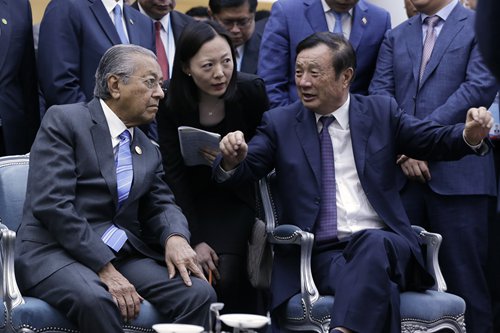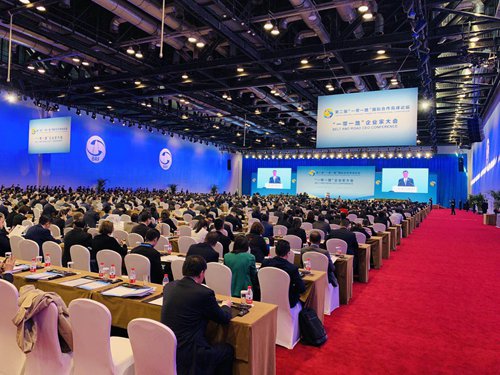BRF gets positive reviews


Since its launch in 2013, the Belt and Road Initiative (BRI) has delivered results that have injected strong growth impetus in a world that is full of uncertainty, participants at the second Belt and Road Forum for International Cooperation (BRF) said.
Nearly 5,000 delegates from 150 countries and 90 international organizations are in the Chinese capital city from Thursday to Saturday for the event, expecting to see how they can further benefit from and contribute to the platform in the future.
On Thursday, Swiss President Ueli Maurer said at a press conference held in the Switzerland Embassy in Beijing that the country will sign a memorandum of understanding (MOU) on BRI with China on Monday. So far 126 countries and 29 global organizations have joined the BRI, the Xinhua News Agency reported.
On Thursday, 12 sub-forums featuring trade, financing, regional cooperation, digital communication, people-to-people exchanges and others were held in Beijing, as well as a CEO conference that attracted around 900 representatives from companies, trade organizations and business groups from home and abroad.
Global Times reporters found that deals inked during the Thursday events went beyond traditional trade sectors. Cooperation agreements on cloud services, new-energy cooperation, and in financial technologies were also reached.
“The BRI is a beautiful example of what kind of international cooperation the world needs,” Former French prime minister Jean-Pierre Raffarin told the Global Times.
“The world is dangerous as it faces threats from terrorism, climate change, migrant crisis, trade wars and we disagree with a lot of things right now. What the world needs right now is more cooperation and less tension,” Raffarin said.
“The BRI is an initiative for peace, because it’s an initiative for cooperation,” remarked Raffarin.
For Gregory Bowen, Minister of Infrastructure Development, Public Utilities, Energy, Transport and Implementation of Grenada, the BRI is a platform where every country involved is treated equally regardless of their size.
“Unlike some big economic powers who often speak down to us, China listens to the small country about what they want to say and consults with us,” said Bowen.
“Some big powers are fearful that they may lose total control in some areas because of the initiative, but the rest of us are looking at the initiative with hope,” he noted.
The Grenadian minister said that his country, that is only 344 square meters in the Caribbean currently with a population of 112,000, is looking toward more cooperation with China in trade and digital communication cooperation.
Vera Songwe, executive secretary of the UN’s Economic Commission for Africa, told the Global Times that she was expecting more actionable agreements to be reached by the end of the second BRF in sectors such as infrastructure and logistics.
Songwe noted that the second BRF has been very forward-looking by having a forum on digital cooperation as the sector is important for allowing more and better commerce.
“We come first with a desire to see how the 1.3 billion population market of Africa can speak to China,” she said.
Songwe said that the trade relationship between China and Africa is one where there is more value added on both sides and offers better mutual win-win benefits.
Positive results
Delegates to the forum told the Global Times that the increasing participation shows that cooperation under the framework of the BRI is delivering positive results and that the benefits of the initiative are gaining wider recognition from international community.
During the past six years, the BRI has brought tremendous opportunities to the participant countries. According to the quantitative trade model of a World Bank study, the BRI will increase the GDP of East Asian and Pacific developing countries by 2.6 percent to 3.9 percent on average.
These figures mean more job opportunities, more people shaking off poverty, and improved infrastructure in the Belt and Road countries.
“In terms of digital movement, Saudi’s telecom industry is the 12th-largest global telecom market and we’ve arrived at this position in partnership with China,” said Abdullah Alswaha, minister of Communications and Information Technology in Saudi Arabia.
Companies like Huawei and ZTE’s transfers of technology and know-how have helped Saudi Arabia arrive at this position and when other markets are either flat or declining, Saudi Arabia’s market is growing by double digits, said the minister.
Partnerships with Chinese companies have helped Saudi Arabia redefine education, smart healthcare, smart cities and have ignited a whole new economy in Saudi Arabia, noted the minister.
“Our Chinese strategic partners have helped train 8,000 Saudi professionals on these basic and advanced technologies in the past 18 months,” said Alswaha.
Xie Wenting and Wang Wenwen contributed to this story












